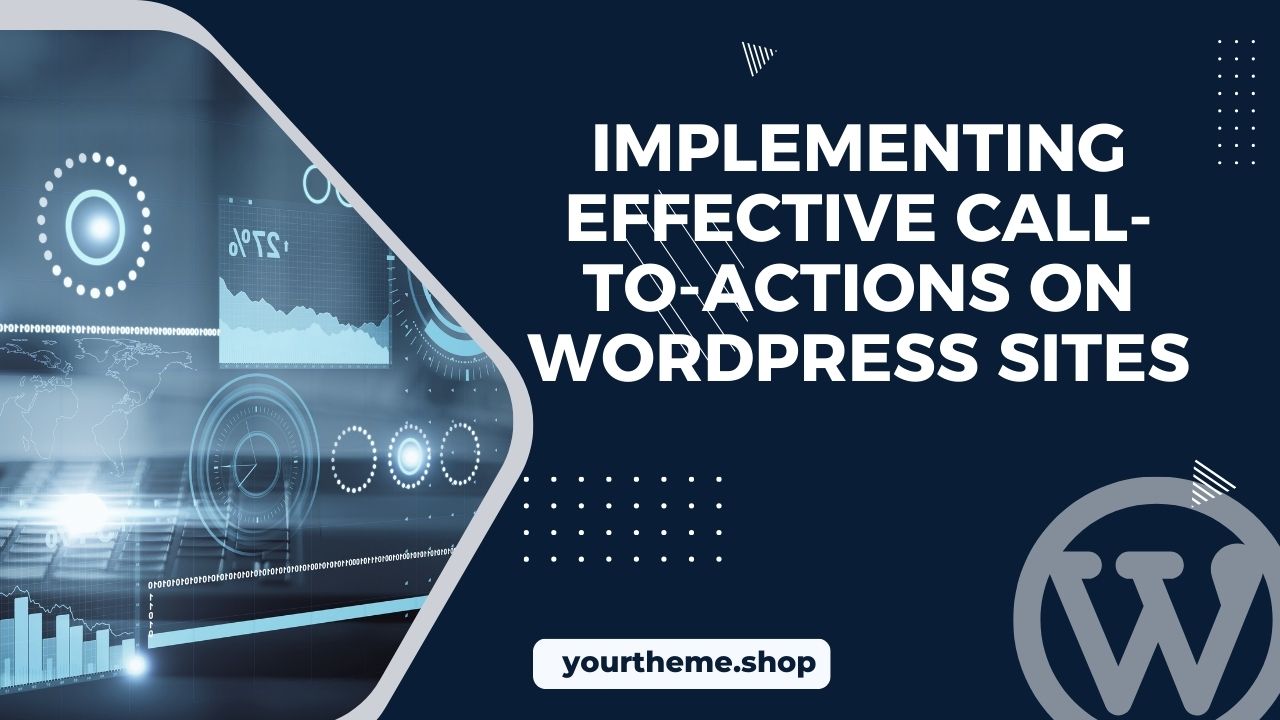In the digital landscape, the success of a WordPress site often hinges on its ability to engage visitors and prompt action. This is where the power of well-crafted Call-to-Actions (CTAs) comes into play. As a proficient SEO and copywriter, I understand the nuances of creating irresistible CTAs on your WordPress website. In this detailed guide, I will share insights on implementing effective call-to-actions on WordPress sites, ensuring they not only capture attention but also drive conversions.
Implementing Effective Call-to-Actions on WordPress Sites
Designing Effective CTAs for WordPress Sites
Key Principles of CTA Design
Understanding the Psychology Behind CTA Design
The effectiveness of a Call-to-Action (CTA) on a WordPress site hinges not just on its visual appeal, but more importantly, on the psychological triggers it activates. When implementing effective call-to-actions on WordPress sites, it’s essential to understand the interplay of colors, shapes, and language that compels users to take action.
Utilizing Colors and Contrast
- Contrasting Colors: Utilize colors that stand out against your website’s color scheme. Contrasting colors can draw attention to your CTA, making it more noticeable.
- Color Psychology: Different colors evoke different emotions. For example, blue can convey trust, while red can create a sense of urgency.
Crafting Compelling CTA Text
- Action-Oriented Language: Use verbs that inspire action, such as ‘Download’, ‘Subscribe’, or ‘Get Started’.
- First-Person Pronouns: Phrases like ‘Start My Free Trial’ can be more effective than ‘Start Your Free Trial’. This subtle change can create a more personal and engaging experience.
Visual Cues and Button Design
- Using Arrows and Icons: Visual cues like arrows can guide the user’s eye towards the CTA, subtly encouraging them to click.
- Button Shape and Size: The shape and size of the CTA button should be large enough to be noticed but not so large as to overwhelm the rest of the page’s content.
Boosting Engagement: Strategies for Effective WordPress CTAs
Placement and Visibility
- Strategic Placement: Place CTAs in high-traffic areas of your site, such as above the fold on the homepage or at the end of blog posts.
- Visibility Across Devices: Ensure CTAs are prominently visible on both desktop and mobile devices.
Creating a Sense of Urgency
- Limited Time Offers: Phrases like ‘Limited Offer’ or ‘Sale Ends Soon’ can create a sense of urgency, prompting quicker action from users.
- Countdown Timers: Implementing countdown timers next to CTAs for time-sensitive offers can increase the likelihood of immediate action.
Creating Irresistible CTAs: A Step-by-Step Approach
Step 1: Define the Objective
- Clear Goal Setting: Determine what action you want users to take – whether it’s signing up for a newsletter, downloading a whitepaper, or making a purchase.
Step 2: Design the CTA
- Designing for Impact: Use design elements that align with your site’s aesthetic while ensuring the CTA stands out. Test different designs to find the most effective one.
Step 3: Test and Optimize
- A/B Testing: Experiment with different versions of your CTA to see which performs better. Test elements like wording, color, and placement.
- Analytics and Adjustment: Use analytics to track CTA performance and make adjustments based on real data.
Maximizing Conversions: Implementing Effective CTAs in WordPress
Conversion-Focused Strategies
- Clear Value Proposition: Ensure your CTA clearly communicates the value or benefit the user will receive by taking action.
- Minimizing Friction: Reduce the number of steps or amount of information required to complete the action, making the process as easy as possible for the user.
Leveraging WordPress Tools and Plugins
- Utilizing WordPress Plugins: Explore plugins that can help create and manage CTAs, such as Thrive Leads or Convert Pro, to enhance your site’s conversion potential.
- Integrating with Landing Pages: Ensure your CTAs lead to well-designed landing pages that are optimized for conversion, providing a seamless user journey from CTA to action completion.
Implementing Effective Call-to-Actions on WordPress Sites
To implement effective CTAs on your WordPress site, consider their placement carefully. Whether it’s at the end of a blog post, the header of your homepage, or a floating sidebar, the location can significantly impact the CTA’s performance.
Strategies for Boosting Engagement with WordPress CTAs
Techniques for Capturing User Attention
Capturing user attention requires more than just a flashy button. It’s about creating a narrative that leads the user to take action. This could involve storytelling, offering value, or highlighting a problem that your service or product can solve.
Boosting Engagement: Strategies for Effective WordPress CTAs
Understanding Your Audience for Tailored CTAs
To effectively boost engagement on your WordPress site, it’s crucial to deeply understand your audience. This involves researching their behaviors, preferences, and needs. Implementing effective call-to-actions on WordPress sites starts with this understanding, as it allows you to tailor your CTAs to the specific interests and pain points of your audience.
Analyzing Audience Interactions
- User Behavior Analysis: Utilize tools to analyze how users interact with your site. Look at which pages they visit, how long they stay, and what actions they take.
- Feedback Collection: Regularly collect feedback through surveys or feedback forms to understand what your audience expects from your site.
A/B Testing for Optimized CTA Performance
A/B testing is a powerful tool in creating irresistible CTAs on your WordPress website. By experimenting with different designs, messages, and placements, you can determine what resonates best with your audience.
Implementing A/B Testing
- Design Variations: Test different CTA button designs, including colors, sizes, and shapes.
- Copy Variations: Experiment with various CTA texts to see which phrases or words drive more clicks.
- Placement Trials: Change the placement of your CTAs to find the most effective spots on your pages.
Maximizing Conversions: Implementing Effective CTAs in WordPress
Maximizing conversions requires a strategic approach to CTA implementation. This means not only creating compelling CTAs but also placing them strategically throughout your WordPress site to guide users towards desired actions.
Conversion-Focused Strategies
- Urgency and Scarcity: Use CTAs that create a sense of urgency or scarcity, encouraging users to act quickly.
- Value Proposition: Ensure your CTAs clearly communicate the value or benefit the user will receive by clicking.
Advanced Techniques for CTA Optimization
Leveraging User Data for Personalized CTAs
Personalization can significantly increase CTA effectiveness. Use user data to create personalized CTAs that speak directly to individual users or specific audience segments.
Personalization Tactics
- Behavior-Based CTAs: Implement CTAs based on user behavior, such as browsing history or previously viewed products.
- Segment-Specific CTAs: Create different CTAs for different audience segments, such as new visitors versus returning customers.
Continuous Improvement through Analytics
Regularly analyze your CTA performance using analytics tools. Look at metrics like click-through rates and conversion rates to understand how well your CTAs are performing and where there’s room for improvement.
Analytics-Driven Refinements
- Performance Tracking: Use tools like Google Analytics to track the performance of your CTAs.
- Iterative Testing: Continuously test and refine your CTAs based on analytics insights.
Creating Irresistible CTAs: A Step-by-Step Approach
Crafting CTAs that Convert
To craft CTAs that convert, focus on clarity, conciseness, and a compelling call to action. Use first-person pronouns to create a personal touch, and ensure the CTA aligns with the user’s intent.
Step-by-Step Guide to Crafting Irresistible CTAs on Your WordPress Website
Follow a structured approach to create your CTAs. Start by defining the goal of your CTA, understand your audience, design the CTA, and then test and refine it based on user feedback and analytics.
Maximizing Conversions with Strategic CTA Placement
Optimal Placement for Maximum Impact
The placement of your CTA can significantly impact its effectiveness. Consider placing CTAs in high-visibility areas like the top of your homepage, within blog posts, or at the end of a page.
Maximizing Conversions: Implementing Effective CTAs in WordPress
To maximize conversions, ensure that your CTAs are clear, compelling, and provide a value proposition. Make it easy for users to take the desired action, whether it’s signing up for a newsletter, downloading a resource, or making a purchase.
Leveraging Analytics for CTA Optimization
Analyzing CTA Performance
The Importance of CTA Analytics in WordPress
In the realm of digital marketing, particularly when implementing effective call-to-actions on WordPress sites, analyzing CTA performance is crucial. It’s not just about creating attractive buttons; it’s about understanding how these buttons perform in real-world scenarios and how users interact with them.
Utilizing Analytics Tools for CTA Tracking
To effectively track the performance of your CTAs, utilize robust analytics tools. These tools provide insights into various metrics that are critical in evaluating the success of your CTAs.
Key Metrics for CTA Analysis
- Click-Through Rates (CTR): This metric measures how often people click on your CTA after seeing it. A high CTR indicates that your CTA is compelling and relevant to your audience.
- Conversion Rates: Conversion rate tracks how many clicks on your CTA result in the desired action, such as a sign-up, download, or purchase. This metric is vital for assessing the effectiveness of your CTAs in driving conversions.
- Bounce Rates: Bounce rate analysis helps understand if your CTAs are engaging enough to keep visitors on your site or if they are leaving without interacting.
Boosting Engagement: Strategies for Effective WordPress CTAs
To boost engagement, analyze which CTAs are performing well and replicate their strategies across your site. Experiment with different designs, placements, and messages to see what resonates best with your audience.
Creating Irresistible CTAs: A Data-Driven Approach
Leveraging Data for CTA Optimization
Use the data from your analytics to refine and optimize your CTAs. For instance, if a particular CTA has a low click-through rate, consider changing its design or placement.
Maximizing Conversions: Implementing Effective CTAs in WordPress
To maximize conversions, focus on CTAs that have proven effective in your analytics. Implement similar strategies across different pages and posts to replicate success.
Advanced Techniques in CTA Analytics
A/B Testing for CTA Optimization
A/B testing is a powerful tool in CTA optimization. By creating two versions of a CTA and testing them against each other, you can determine which elements work best in terms of design, wording, and placement.
Analyzing User Behavior for CTA Improvement
Understanding user behavior is key to creating irresistible CTAs on your WordPress website. Use heatmaps and user session recordings to see how users interact with your CTAs and make data-driven improvements.
Using Data to Refine Your CTA Strategy
Based on the data, refine your CTA strategy. This might involve changing the wording, design, or placement of your CTAs to better align with your audience’s preferences and behaviors.
Advanced Techniques for WordPress CTA Optimization
Exploring Innovative CTA Formats
Don’t be afraid to experiment with different CTA formats. This could include floating CTAs, pop-up forms, or interactive CTAs that change based on user behavior.
Advanced Strategies for WordPress CTA Success
Consider using dynamic content for your CTAs, where the CTA changes based on the user’s past interactions with your site. Personalization can significantly increase the relevance and effectiveness of your CTAs.
Master the art of effective Call-to-Actions on WordPress. From psychology-based design to strategic placement, elevate engagement and drive conversions.






